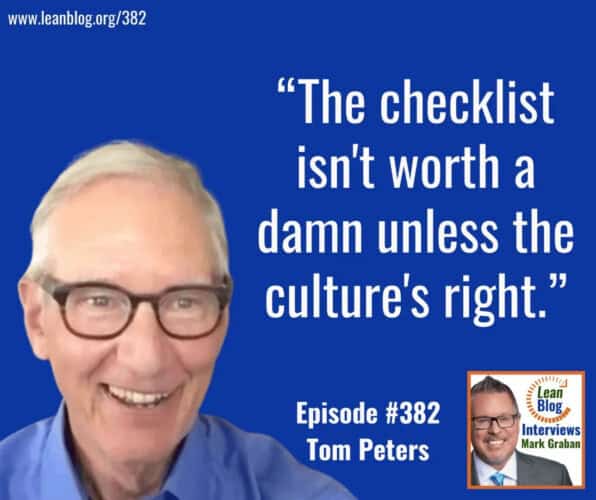Thanks, as always, to Ryan McCormack for this. He always shares so much good reading, listening, and viewing here! Subscribe to get these directly from Ryan via email.
News, articles, books, podcasts, and videos about how to make the workplace better.
Operational Excellence, Improvement, and Innovation
I was working in healthcare in 2009 when the WHO Surgical Safety Checklist was sweeping through Operating Rooms across North America with the promise of harm reduction at almost no cost. Dr. Atul Gawande further popularized the checklist with The Checklist Manifesto, making the case for surgical theaters to adopt the tools and practices of the aviation industry and its enviable safety record. It seemed obvious – implement a simple checklist process and reduce harm by up to 50%. But many hospitals (including the one I worked at) struggled to adopt the practice and replicate the outcomes from the 2009 WHO study, demonstrating again that tools are no substitute for culture.
15 years later, a team at Adriane Labs is reimplementing the surgical safety checklist at Singapore General Hospital by addressing the people side of change.
Here's Tom Peters with a not-so-subtle reminder from Lean Blog Interviews of the trouble with checklists:

Human Error or System Deficiency?
On the heels of the Crowdstrike global IT outage, I recall being affected by a 2022 nationwide wireless outage, and lamenting the monopolistic structure of wireless networks in Canada. A third-party analysis of the outage at Rogers that left 12 million without wireless service and access to 911 was ” caused by human error and made worse by management and system ‘deficiencies'.”
The headline focuses on blaming human error yet the article describes technical or system causes, which is consistent with our general desire to blame someone – usually an operator. The executive summary from Xona ping pongs between assigning blame to the operator, the (technical) change management process, and the actual network architecture. To their credit, the report details that the actions taken weren't focused on “retraining the operators on proper configuration”!
Quick – define “quality“?
Have you ever asked (or asked ChatGPT) to define quality? It's harder than you think. Michel Baudin shares a compelling definition: “the agreement of reality with expectancy.” He then briefly walks through a 2069-year history of other definitions in What is Quality?
Scientific Thinking in 2 Minutes
In my decades as an improvement practitioner, I often challenge leaders to think scientifically, prompting them to respond with “what exactly do you mean by thinking scientifically?”
Creating a Culture of Improvement
No, your giant list of initiatives on a roadmap is not a strategy. Roger Martin challenges almost all of the traditional myths about strategy.
Bring Strategy Into the Work
I've noticed over the last several years that large organizations are finding it increasingly difficult to clearly define their strategy, which makes it very difficult to translate and filter closer to the work, and can overwhelm operational leaders such that they don't know where to start. Here are 6 Ways to Bring Strategy Into Your Work Every Day .
Want to engage your workforce? Make work easier for your managers.
Research from Gallup shows that making managers' jobs more streamlined and engaging helps drive workforce engagement. Critical to making this happen: selecting the right candidates for management and reducing the administrative burden of manager jobs.
Coaching – Developing Self & Others
David Dunning discusses the Dunning-Kruger Effect
David Dunning of the Dunning-Kruger effect appeared on the latest episode of Work Life with Adam Grant to discuss confidence and competence. He reminds us that we are pretty good at seeing the overconfidence relative to competence in others, but it's harder to see in ourselves.
Your Mindset Matters
“People speak with their feet, and when it comes to continuous improvement, you can clearly see this in action,” according to John R. Miles, author of Passion Struck: Twelve Powerful Principles to Unlock Your Purpose and Ignite Your Most Intentional Life. Miles recommends being more intentional, including embracing daily reflection, breaking down your goals, staying true to your core values, and seeking feedback. If you want a more purpose-filled life, mindset matters.
Follow Ryan & Subscribe:
LinkedIn: https://www.linkedin.com/in/rjmccormack/
Subscribe to receive these via email
What do you think? Please scroll down (or click) to post a comment. Or please share the post with your thoughts on LinkedIn – and follow me or connect with me there.
Did you like this post? Make sure you don't miss a post or podcast — Subscribe to get notified about posts via email daily or weekly.
Check out my latest book, The Mistakes That Make Us: Cultivating a Culture of Learning and Innovation:









